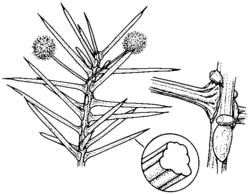Common name: Myall Creek wattle
Acacia atrox Kodela APNI* Synonyms: Racosperma atrox (Kodela) Pedley APNI*

Description: Shrub or small tree 0.5–6 m high, often suckering; bark grey-brown, fissured with age; branchlets terete, pale green to yellowish green, glabrous, with low rounded longitudinal ridges.
Phyllodes sessile, rigid or subrigid, straight to slightly curved, ± terete to 4-angled in section, with 4 main longitudinal veins and several less prominent, obscure or incomplete veins, 1.5–5 cm long, 0.7–1.5 mm wide, abruptly broadened and longitudinally splayed at base for 1–6 mm (leaving an ovate to obovate scar on branchlet when lost), glabrous (except immature phyllodes with scattered appressed, white-hyaline hairs); tapered to a pungent-pointed apex with a fine orange-brown tip (cusp) 0.7–3.5 mm long; 1 small ± circular gland near base, often a second (and rarely third) minute gland along phyllode.
Inflorescences 1 or 2 on a short axis to 1 mm long in axil of phyllodes; peduncles 5–32 mm long, glabrous; heads globose, 17–41-flowered, 5–11 mm diam., cream-coloured to pale yellow.
Pods and seed not known.
Flowering: March–July.
Distribution and occurrence: recorded from the Inverell and Moree areas; rare. The type subspecies grows in a eucalypt woodland-pasture area, on a hill crest and upper slope; subsp. planitiicola grows on a black soil plain.
NSW subdivisions: NWS, NWP
Threatened species: NSW BCA: Critically Endangered
The Latin atrox means atrocious, fierce, terrible, savage, harsh; referring to the fierce or severe character of the plant due to its prominent pungent-pointed foliage. The original description, which now relates mainly to subsp. atrox, can be found in P.G. Kodela, Telopea 9(2): 415–419 (2001). Both subspecies are endemic to New South Wales with restricted distributions (only known from the type localities).
Text by P.G. Kodela (last update Aug 2012)
Taxon concept: L.M. Copeland & P.G. Kodela, Telopea 14: 63-68 (2012)
| | Key to the subspecies | |
| 01 | Phyllodes with ± 8 longitudinal veins (4 more pronounced than the intervening inconspicuous veins), longitudinally splayed at base by 2–6 mm, gradually tapered towards a pungent apex with a fine orange-brown tip (cusp) 1.5–3.5 mm long; heads 17–25-flowered, 5–7 mm diam. | subsp. atrox |
| Phyllodes with 4 inconspicuous longitudinal veins (other veins obscure), longitudinally splayed at base by 1–2.2 mm, gradually to abruptly tapered towards a pungent apex with a fine orange-brown tip (cusp) 0.7–2.2 mm long; heads 33–41-flowered, 7–11 mm diam. | subsp. planitiicola |
APNI* Provides a link to the Australian Plant Name Index (hosted by the Australian National Botanic Gardens) for comprehensive bibliographic data
***The AVH map option provides a detailed interactive Australia wide distribution map drawn from collections held by all major Australian herbaria participating in the Australian Virtual Herbarium project.
|


